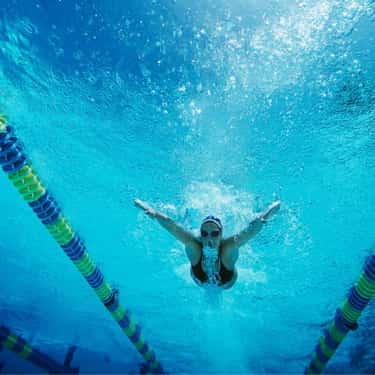Competitive swimming is dominated by “taller than average” people. It is no secret that being tall is a big advantage when it comes to competitive swimming and swimming fast. [source]
Shorter swimmers are missing this natural height advantage, but shorter swimmers can still swim super fast and compete at an elite level.
To improve your swim speed as a shorter person, the main area where you can make a significant speed improvement is by improving your underwater kick. i.e. dolphin kick and improving your tumble turns.
As a short swimmer myself, (I am 5 feet tall), I don’t want to let my shorter height affect my swim speeds both physically or mentally.
In this article I want to look at:
- What height is considered short for a swimmer?
- Can a short person be an Olympic swimmer?
- How to swim fast if you are short (Top Tips)
- Why are there so few short swimmers?

What Is Considered Short For A Swimmer?
It is well documented that the average height of a swimmer on the USA swim team is between 4″ to 6″ taller than the average person in the USA, so what exactly is short for a swimmer? [source]
Recreational Swimming
As a recreational swimmer, short can be any height and is completely subjective.
Yes, height can be an advantage in swimming for sprints or races less than 400m, but unless you are competing at the highest levels, this is not a concern.
For recreational swimming, anything goes. There is no such thing as a short swimmer, just a swimmer.
Competitive Swimming
Like all sports, once you start competing, everyone looks for an edge.
When you reach Olympic standard, every millisecond is up for grabs and if you can grab that millisecond advantage from anywhere, you will take it.
Therefore, in competitive swimming at the highest levels of competition, height can make a difference in the sprint races that are less than 400m.
In these shorter races, every advantage counts and being long and powerful is hard to compete with.
There have been many Olympians who are shorter than this, but they are certainly in the minority.
I find it hilarious (and annoying) that other top blogs and swimming magazines refer to short swimmers as someone who is “only 5 feet 5 inches”.
Can A Short Person Be An Olympic Swimmer?
There are many examples of short swimmers winning Olympic medals and breaking world records.
Although it is harder to find examples of shorter swimmers winning short course Olympic sprint races, for example, any distance under 400m. But for races that are 400m or longer, shorter swimmers are just as effective and competitive.
For short races, the key is power and speed. For races under 400m, every advantage counts and a height advantage will give you an edge for these shorter distances.
Tomoru Morita, a Japanese swimmer of 5’6″, was a bronze medallist in the 100m backstroke in 2004.
For races that are 400m and longer, however, the technique is more important, which reduces the height advantage that taller swimmers have.
It is in these longer distance races that shorter swimmers can smash world records and prove that you do not have to be tall to be an elite swimmer.
Here are some great examples of world-class Olympic swimmers that are on the shorter side.
| Name | Height | Country |
|---|---|---|
| Janet Evans | 5’5″ | USA |
| Katika Hosszu | 5’6″ | Hungray |
| Tomomi Morita | 5’6″ | Japan |
| Brad Cooper | 5’3″ | Australia |
| Ricardo Prado | 5’6″ | Brazilian |
How To Swim Fast If You are Short
There are some key areas that shorter swimmers can pay attention to, to make up time and swim faster.
1. Underwater Kick
Swimming underwater is much faster than swimming on the surface.
Typically called the dolphin kick, this underwater kick starts every race and involves pulsing the body up and down in a “sine-like” wave motion.
As a shorter person, you can pulse the body more quickly as you have less length to control.
This can cause a very fast underwater kick, making shorter swimmers primed for exceptional underwater speed.
If you are competing, then working on your underwater kick and getting the most out of this area of your swim will significantly increase your swim times and help you take advantage of your shorter height.
2. Tumble Turns
Perfecting your tumble turns is another area of competitive swimming where shorter swimmers can take advantage of their shorter height.
Being shorter, you have less mass and length to turn in the same amount of space, and as a result, you can pivot in your tumble turns much more efficiently and quickly than a taller person.
A fast and efficient tumble turn, coupled with excellent and fast underwater technique, will gain valuable seconds.
3. Dry Land Training
Improving muscle mass in the gym through weight training can be a great way to build your power and speed for the water.
If lifting weights is not your thing, there are plenty of dry land resistance training exercises you can do to build and maintain your strength.
Here are some great ways to improve your swim times, when you cannot get into the water, How To Get Faster At Swimming Without Swimming?
4. Improve Technique Through Video Analysis
Improving your swim technique to benefit your size is a great way to make the most of your personal body shape and style.
You can improve your swimming technique in several ways, from watching hints and tips on YouTube, or following a swimming teaching method such as “Total Immersion Swimming“.
If you are looking for an edge, signing up for a 1-to-1 video analysis session with a personal coach is a great way to analyse how you swim and fine pick at the details to optimise your stroke.
Swimming video analysis can be found across the globe through Swim Smooth and here in the UK, typically costs about £120 for a 90-minute session.
Although not cheap, if you want to swim fast, this is a great way to analyse and work on your technique.
5. Improve Flexibility
Keeping flexible and healthy is a great way to improve your speed.
Ankle flexibility can be a significant area to work on if you want to swim faster.
With good ankle flexibility comes a more efficient kick, which will get the most out of your leg work.
There are many ways you can improve ankle flexibility. I have covered this in greater detail in this article, How To Get Faster At Swimming Without Swimming?
Why Are There So Few Short Swimmers?
History tells us that short swimmers can win Olympic medals too, but in recent years, you will notice very few short swimmers at the Olympics.
As a shorter swimmer myself, this bothers me. Although personally I have no ambition to compete, there are millions of talented short swimmers out there who might be put off by these swimming giants.
So where are our shorter swimmers these days?
From doing my own research, I have found that many coaches get asked by parents if their short child has a chance of being a competitive swimmer.
Could this be a blockage keeping shorter swimmers out of elite swimming?
With so much investment in elite sport needed, from early morning starts, to hours of travel, many parents want to ensure their child is in pole position before competing for that sports scholarship.
As there is a slight disadvantage in being a shorter swimmer, this could be one reason why we are not seeing so many shorter swimmers coming through the professional ranks.
This is just a theory, but the bias towards tall swimmers is hard to ignore when swimming legends such as Janet Evans, Brad Cooper, and Tomomi Moriata, have already proven that short can also be fast.
Final Thoughts
As a short swimmer, I am fascinated with the height of swimmers and how it affects my swim speeds.
Looking at elite Olympians, however, I can see that being short does not mean that you cannot swim fast or compete at the highest level.
Like all things in competitive sport, it is about focusing on your own edge, what advantages you have and improving your technique to get the best from your performance.
Happy swimming!
